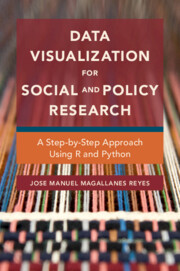
- Publisher:
- Cambridge University Press
- Online publication date:
- March 2022
- Print publication year:
- 2022
- Online ISBN:
- 9781108625425

All social and policy researchers need to synthesize data into a visual representation. Producing good visualizations combines creativity and technique. This book teaches the techniques and basics to produce a variety of visualizations, allowing readers to communicate data and analyses in a creative and effective way. Visuals for tables, time series, maps, text, and networks are carefully explained and organized, showing how to choose the right plot for the type of data being analysed and displayed. Examples are drawn from public policy, public safety, education, political tweets, and public health. The presentation proceeds step by step, starting from the basics, in the programming languages R and Python so that readers learn the coding skills while simultaneously becoming familiar with the advantages and disadvantages of each visualization. No prior knowledge of either Python or R is required. Code for all the visualizations are available from the book's website.
'Sometimes social science students understand the value of data visualization, but they are wary of the costs of mastering high-tech approaches. Professor Magallanes is the answer to this problem. This text skillfully articulates a step-by-step guide for using two of the most powerful tools in a data scientist's toolbox: R and Python. Professor Magallanes has a talent for simplifying the complicated, and honing in on the most important components of telling stories with data. This book is an essential resource for anyone whose regular habits of making graphs involve searching for someone else's code chunks on the Internet. With this book, we can all stop Googling and start graphing.'
Jennifer Nicoll Victor - Professor of Political Science, George Mason University
'José Manuel Magallanes Reyes is back at it again with his unique approach of simultaneously introducing users to computational social science programming in both R and Python. The approach allows readers not just to ‘learn a language’, but rather to learn the key conceptual ideas behind programming and computational social science. With his first volume having tackled data collection and statistical analysis, it was an absolute pleasure to see him turn his approach to the all-important subject of data visualization in this text. Having recommended his previous book to countless numbers of students, I am absolutely thrilled to now have a second volume to share as well!'
Joshua A. Tucker - Professor of Politics and Co-Director, Center for Social Media and Politics, New York University
'Professor Magallanes cuts directly to the heart of the matter, quickly and clearly imparting the concepts and skills that a modern social science researcher needs to communicate complex data relationships. He leads the reader through a wide variety of visualization approaches using a conversational style and systematic approach.'
Dr. Timothy Gulden - Senior Policy Researcher, RAND Corporation
'A wise professor once told me, ‘If there is something you want your audience to remember, put it in a figure.’ This timely volume will show you how, with copious examples drawn from extensive experience in social and policy research.'
Abraham D. Flaxman - Professor of Global Health at the Institute for Health Metrics and Evaluation, University of Washington
'Information literacy demands that we convey data in digestible, visually appealing plots and graphs. However, even advanced quantitative researchers often lack the tools to produce effective visualizations of the data they work with. This is where Magallanes’ book comes in. With his characteristic narrative – a meticulous but nimble prose, chock full of illustrative examples – Magallanes guides inexperienced and sophisticated readers alike through easy-to-grasp data visualizations. His presentation of geospatial and network data visualizations alone makes this an invaluable go-to reference for those working in R and Python.'
Guillermo Rosas - Professor of Political Science, Washington University in St. Louis
'Surviving the current deluge of social science data is only possible with novel computational analysis and machine learning techniques. Among the many approaches currently in vogue, none is more important than human visualization of data, whether in raw form, suitably plotted, or else transformed in some way meaningful to the problem at hand. Professor Magallanes’ new book offers a wide range of general approaches and explicit code for developing modern data visualizations. It will be an important addition to the library of every social scientist and policy researcher contending with the flood of new data.'
Robert Axtell - Professor of Computational Social Science, Department of Computational and Data Sciences, and Department of Economics, George Mason University
'José Manuel Magallanes Reyes’ Data Visualization for Social and Policy Research is an outstanding and greatly needed resource in a rapidly expanding area of academic and applied data analysis and empirical methodology. The guided instruction is accessible to novice users and soon has us producing powerful visualizations from simple univariate, bivariate, multivariate, geospatial, and social-media text data.'
Robert J. Franzese Jr. - Professor and Associate Chair, Department of Political Science, The University of Michigan, Ann Arbor; Fellow and former President, The Society for Political Methodology
''A picture is worth a thousand words.’ Nowhere is this more the case than when presenting data to policymakers in order to guide decision-making. In this book, José Manuel Magallanes Reyes shows us how, drawing upon his extensive background in social science, public policy, data science, analytics, and teaching visualization to undergraduate and graduate students in political science and public policy.'
Ed Lazowska - Professor, and Bill & Melinda Gates Chair Emeritus, Paul G. Allen School of Computer Science & Engineering, Founding Director of the eScience Institute, University of Washington
 Loading metrics...
Loading metrics...
* Views captured on Cambridge Core between #date#. This data will be updated every 24 hours.
Usage data cannot currently be displayed.